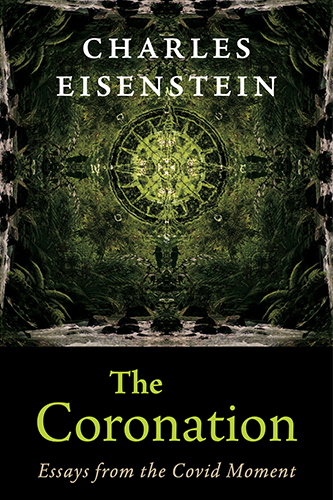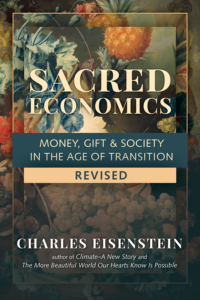Climate — A New Story
Chapters
Chapter 9: Energy, Population, and Development
The Meaning of Development
It takes energy to exert force; therefore, the energy crisis invites us into a less forceful way of life. To equate that with a regress in human well-being reflects the prejudices of our time. Another mode of development beckons.
Holistic medicine is not more energy-intensive than high-tech medicine; it is less. Regenerative agriculture is not more energy-intensive than chemical-dependent agriculture; it is less. Close knit communities and extended families are not more energy-intensive than the single-family home; they are less. What’s more, these alternatives produce better health, abundant food, and more happiness than the present models.
Therefore, the main question in sustainability discourse is the wrong question. “How do we meet humanity’s growing demand for energy?” carries assumptions that needn’t be true. We can shift to a mode of development different from the Western model of the last several centuries.
A woman in India told me several years ago, “I grew up in a household of more than a hundred people. Aunts, uncles, cousins … several generations were under one roof in our compound. As children we always had lots of people to play with, and every adult we saw was someone who loved us.”
“But then,” she said, “it all changed. The family got rich, and now everyone moves out of the compound when they get married to form their own household. No one stays in the village. We are all much wealthier now, each owning our own home and our own car, but no one is as happy as we were when I was a child. When couples argue there isn’t anyone to hear them. There is no one to help look after the children and no one for them to play with.”
Something similar has happened around the world, as small towns and villages have emptied in a tide of urbanization propelled by the ideology and economics of development. Many people assume such development is inevitable and desirable: that the manifest destiny of every Chinese peasant and Indian villager is to arrive at an American lifestyle, driving around in a private automobile, living in a three-thousand-square-foot house with separate bedrooms for each child, shopping at a supermarket for food grown a thousand miles away, entertaining themselves with digital media. Maybe, the optimists think, it could work if their electric grid is powered by wind turbines and their cars are fueled by ethanol or hydrogen or run on electricity. Meanwhile, pessimists point out various difficulties in achieving such a lifestyle for all without overstepping various planetary boundaries.
Lost in the debate is the question of whether such an outcome is desirable. More and more people in the West are now realizing it is not. Many who achieve the American Dream—a dwindling prospect—discover it to be the American Nightmare. I live in a country where nearly one in five people takes psychiatric medication for depression and anxiety, where suicide and addiction are at historic levels, where a third of all children suffer abuse, where half of marriages end in divorce. These afflictions transcend race and class. Neither privilege nor success is proof against them.
Realizing the bankruptcy of the Dream, many people in the West walk out of it. Some do it consciously and others not (the paralysis of severe depression or the escapism of addiction might be considered a sort of unconscious walkout). Those who do it consciously seek to live in a different way. They get their hands in the soil. They live communally. They unplug from digital media. They downsize their houses and their incomes. They seek to learn from cultures who have preserved other ways of living. Today they exist mostly on the margins of society, but it needn’t be so. They embody an invitation into a once and future way of being.
Rather than think about how to sustain an energy-intensive social infrastructure, we should think about transforming it altogether—and not for the reason of using less energy. A shift in values toward the local, the participatory, the embodied, the communal, toward wholeness and empathy, toward the restoration of ecological relationships, will necessarily reduce energy consumption as a side effect. That is inevitable, when we no longer try to dominate and control the world through force. It is inevitable when we accept ourselves as a part of it and listen for how we might participate in its unfolding.
The reason to deurbanize, relocalize, downsize, re-skill, return to the soil, and live in community need not be to reduce energy consumption or cut greenhouse gas emissions. These and other quantifiable benefits that result are barometers of health and not its essence. The reason can be to restore the connections that make us happy, to come back into relationship with each other and with the beings of nature, to live in a way aligned with the Story of Interbeing, which says that relationship is who we are.
There are many commentators in the Post-carbon and Transition Town movements who well understand the futility of trying to switch to renewable energy sources while keeping everything else the same. Most, though, still subordinate social transition to the exigencies of climate crisis or energy shortage. Either they say, “We cannot maintain our standard of living as it has been, and will have to prepare for a downgrade,” or they say, “Let us begin doing the things that are necessary to transition to a post-carbon world.” They subordinate choice to necessity. What if, as suggested in chapter 7, we will not be forced into an ecological future? What if we must choose it?
Many are already choosing it, as best they can within an existing social and economic matrix that is hostile to it. I don’t hear anyone saying, “I left corporate America and took a permaculture design course because I had no choice.” It may very well be that a personal crisis created the conditions for that choosing. It may be that the choice to value a beautiful life over a secure life was until that moment unavailable. We didn’t know that it was an option, until some kind of collapse cleared away an old story. We are not the originators of our choices. We are but the choosers.
The multiple crises converging upon us today present us with new opportunities for choice. We face not a downgrade but an upgrade in our quality of life. Our “standard of living” may decline: standards are a function of quantitative measures. The choice to live in greater wholeness is also a choice for smaller quantities of things like indoor floor space per capita, BTUs of energy consumed, total miles traveled, dollars of health care purchased, volume of global trade, hours of paid professional day care, quantity of prepared foods purchased, total annual timber harvest, and so forth. But unless you think that people are happier in their McMansions than they were in the small homes of yesteryear, unless you think that children are happier being carted around to organized activities than they were playing freely outdoors with a pack of other kids, unless you’d rather fly than walk to visit your dearest friends, our choice can represent an active “yes” to a more beautiful world, not a capitulation to grim necessity.
One way to conceive of the choice before us is that it is to shift from quantitative to qualitative values. To quantify is to master; it is to reduce the infinite variation of the world into standard units. It is to make the world ours, to order it according to our measures. This conceptual imprisonment of the world sets the stage for its actual imprisonment. Unfortunately, as in all prison societies, the jailor becomes a prisoner too. Thus we have become stuck in the endless pursuit of more, more, more.
In The More Beautiful World Our Hearts Know Is Possible, I wrote,
How much of the ugly does it take to substitute for a lack of the beautiful? How many adventure films does it take to compensate for a lack of adventure? How many superhero movies must one watch, to compensate for the atrophied expression of one’s greatness? How much pornography to meet the need for intimacy? How much entertainment to substitute for missing play? It takes an infinite amount. That’s good news for economic growth, but bad news for the planet. Fortunately, our planet isn’t allowing much more of it, nor is our ravaged social fabric. We are almost through with the age of artificial scarcity, if only we can release the habits that hold us there.
Just as people think that if only they had more money, then they would be happy, so also have we thought that we could solve the problems of the world if only we had access to vastly more energy. Oh, the things we could do!
Maybe everyone could have their own mansion and automated private jet. Then we would be happy for sure.
Tellingly, even those who do possess their own mansion and private jet are no happier than anyone else. As I wrote the earlier paragraph on depression, anxiety, etc., I looked online to make sure that I wasn’t just inventing the claim that the wealthy are just as prone to these conditions as others. Isn’t that how you do research too—decide what must be true and then go look for the evidence? Anyway, I came across an article in Forbes magazine entitled “Why the Super-Successful Get Depressed.”[4] Apparently, depression is rampant among chief executives. It makes sense. Before you’ve “made it,” you can blame your unhappiness on not having a bigger house and fancier car, a yacht and a jet. Once you have those things, then what?
I need hardly argue this point; it is a truism that happiness doesn’t come from more, more, more. As individuals, we get it. Collectively, we do not. Public policy takes for granted the quest for more.
There is good explanation for that: Our economic system requires endless growth. Therefore, to choose from qualitative instead of quantitative values, we will need a radically different economic system. We are not talking merely about personal choices here; we also need to change the conditions from which people choose.
This is not a call for stasis. There are many ways to develop, not all of them requiring unending increases in scale. From the standpoint of technologies of force, the currently dominant civilization is indeed the most highly developed the world has ever seen. It exerts more energy to do more work than any before it. But the civilizations it destroyed, marginalized, or absorbed were highly developed in other ways: in their understanding of body energetics, technologies of dreaming, architectural aesthetics, cultivation of consciousness, management of landscapes. Each culture explored and developed human capacities that we are hardly aware of today. Many of them seem impossible to those immersed in the Story of Separation with all its causes and categories. As that story falls apart, these capacities come back into view, and we turn instinctively toward the marginalized as a source of knowledge. This kind of development depends not at all on maintaining current levels of energy consumption. Quite the opposite: development in the Story of Interbeing can hardly happen in the present environment. Climate-controlled dwellings, digitized relationships, long-distance commutes, industrially processed food, alienation from material production, disengagement of the body from work … all of the things that abundant energy has made possible now impede our next phase of development.
How do you want to develop? Which future is closest to your aspirations: a giant flat-screen TV and a robotic housecleaning system in a five-thousand-square-foot house with a three-car garage, accessible by your own private helicopter? Or a small house of natural materials in sacred geometric proportions, ringed by gardens bursting with life, busy with birds, linked to other dwellings by footpaths in a community of people you care about deeply? You’re not the only one! Do you want to “develop” your consciousness, your sensitivity to subtle energies, your familiarity with local plants and animals, your emotional intelligence, and the authenticity of your relationships? Many people hunger for this kind of development. Can you imagine what society would become if it supported it and pursued it collectively, rather than marginalizing it? Such development certainly doesn’t require increased consumption of energy or materials. To the contrary—the quest for more forestalls the shift of attention and priorities that this other mode of development requires.
End Notes
[4] Walton (2015).






